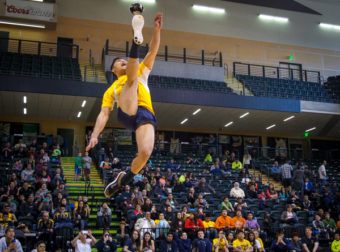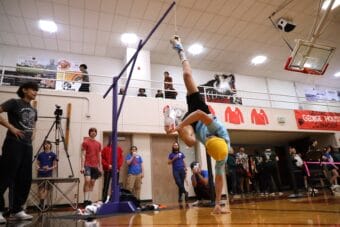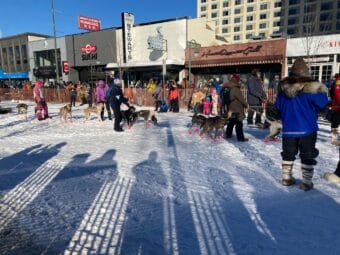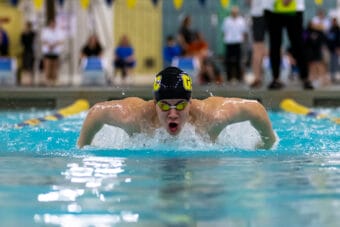
The World Eskimo Indian Olympics is going ahead with its 60th anniversary games next Wednesday. The games were canceled last year and special safety precautions are in place this year to deal with the COVID-19 pandemic. The event is back at the Big Dipper building in Fairbanks, but a lot of contests will be outdoors.
The first World Eskimo Indian Olympics were in 1961 on the banks of the Chena River in Fairbanks. The traditional games and dances have been held every year until 2020. This year, the celebration will keep COVID in mind as coordinators ask attendees to be vaccinated or wear masks.
“Our people have a long and sordid history with epidemics. So it’s not anything we really want to play with. We want to do as much as we can, but we still are going to have some considerations,” said Gina Kalloch, who is Koyukon Dena and chair of the WEIO Board of Governors.
The nine-member board is organizing the games as volunteers because they raised no money last year to hire a staff person for the big event. This 60th anniversary event is likely to require 30 to 40 volunteers. Kalloch says instead of having a contributor of the year award, they’ll have a special acknowledgment of that volunteering tradition.
“Having a commemorative pin made and we will name them all contributor of the year,” Kalloch said.
The games are derived from hunting and whaling, and many are designed to build up brute strength or test endurance to survive in rural Alaska. Events like the knuckle hop and the ear pull challenge the ability to withstand pain, and contests like the Alaska high kick and the toe kick hinge on balance and agility. In some years, dancers and athletes have come from Greenland, Siberia, Canada and Hawaii.
Kalloch says for most events, athletes and judges can stand apart. But coordinators are asking athletes who will be right next to each other to be fully vaccinated before the events begin July 21. That includes the Indian stick pull, Eskimo stick pull, greased pole walk, four-man carry, ear pull and arm pull.
“So, for those games we are requiring vaccinations,” Kalloch said.
Those athletes or volunteers will be given special wristbands that allow them more access around the venue.
Kalloch says she knows they will be asked to make exceptions.
“Its already happened, and we said ‘maybe next year,’” she said.
With athletes, dancers and vendors coming from all over Alaska and the Arctic, the games become like a four-day family reunion. But some of that festive atmosphere will still be muted.
“Dance in place and do not come down to the floor,” Kalloch said.
All daytime events, except for the high kick, will be outdoors on the field behind the Dipper building. All the events will be free.
A special guest, Molly of Denali will be at the event from 6-8 p.m. during the opening ceremonies. A schedule of events and registration information are on the World Eskimo Indian Olympics website.



